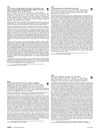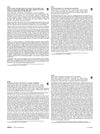 43 citations,
September 2017 in “Lasers in Surgery and Medicine”
43 citations,
September 2017 in “Lasers in Surgery and Medicine” LED light therapy may help hair growth by activating certain cell pathways.
14 citations,
April 2021 in “International journal of molecular sciences” Mesenchymal stem cells may help treat hair loss by improving hair cell growth and reducing inflammation.
 13 citations,
September 2021 in “Current Issues in Molecular Biology”
13 citations,
September 2021 in “Current Issues in Molecular Biology” Dexpanthenol helps human hair follicle cells grow by preventing aging and death, and by supporting growth signals.
 August 2024 in “Biomolecules & Therapeutics”
August 2024 in “Biomolecules & Therapeutics” A new compound, HTPI, promotes hair growth by protecting cells from damage and regulating energy use.
 July 2024 in “Experimental Dermatology”
July 2024 in “Experimental Dermatology” AP collagen peptides help hair grow and improve hair health.
 June 2017 in “Journal of The American Academy of Dermatology”
June 2017 in “Journal of The American Academy of Dermatology” LED light helps hair follicle cells grow and prevents them from dying by activating certain cell pathways.
 May 2017 in “Journal of The American Academy of Dermatology”
May 2017 in “Journal of The American Academy of Dermatology” LED light helps human hair root cells grow and move by activating certain cell pathways.
 May 2017 in “Journal of The American Academy of Dermatology”
May 2017 in “Journal of The American Academy of Dermatology” LED light helps human hair root cells grow and prevents them from dying by activating specific growth pathways.
January 2016 in “프로그램북(구 초록집)” LED light promotes hair growth by stimulating cell proliferation and reducing cell death.
 November 2023 in “bioRxiv (Cold Spring Harbor Laboratory)”
November 2023 in “bioRxiv (Cold Spring Harbor Laboratory)” Disrupted cholesterol production impairs hair follicle stem cells, leading to hair loss.
 49 citations,
November 2014 in “Journal of Medicinal Food”
49 citations,
November 2014 in “Journal of Medicinal Food” Red Ginseng Extract may help human hair grow by activating growth pathways and blocking negative effects of certain hormones.
 31 citations,
February 2014 in “Journal of dermatological science”
31 citations,
February 2014 in “Journal of dermatological science” Placental growth factor may help treat hair loss.
 21 citations,
April 2018 in “Journal of Dermatological Science”
21 citations,
April 2018 in “Journal of Dermatological Science” Cilostazol helps hair grow by making hair root cells grow faster and changing growth factor levels.
 21 citations,
October 2009 in “Biochemical Engineering Journal”
21 citations,
October 2009 in “Biochemical Engineering Journal” Stem cell therapy is a promising approach for hair regrowth despite potential side effects.
 July 2024 in “Biological and Pharmaceutical Bulletin”
July 2024 in “Biological and Pharmaceutical Bulletin” Licorice extract helps hair growth and may treat hair loss.
 7 citations,
December 2021 in “Pharmaceutics”
7 citations,
December 2021 in “Pharmaceutics” Natural products like plant extracts can help promote hair growth and could be used to treat hair loss.
 February 2024 in “Experimental Dermatology”
February 2024 in “Experimental Dermatology” IGFBP-rP1 could be a new treatment for a common type of hair loss.

Justicia procumbens extract may help prevent hair loss and improve hair thickness and shine in a type of hair loss condition.
11 citations,
April 2020 in “Animals” Moving horses to new places can increase their stress levels, as shown by higher stress hormone in their hair.
 5 citations,
October 2013 in “Veterinary Clinics of North America: Equine Practice”
5 citations,
October 2013 in “Veterinary Clinics of North America: Equine Practice” Some horses lose hair without inflammation or itching due to various conditions, and while mainly a cosmetic issue, diagnosis requires examination and biopsies, and breeding is not advised if it's hereditary.
 January 2024 in “Anaesthesia reports”
January 2024 in “Anaesthesia reports” Using a gel head pad during surgery can cause hair loss in children.
73 citations,
December 2015 in “Nature Genetics” Mutations in TBX3 cause horses to have more even hair color instead of Dun camouflage.
 6 citations,
May 2015 in “Veterinary Clinics of North America: Equine Practice”
6 citations,
May 2015 in “Veterinary Clinics of North America: Equine Practice” Horse skin diseases are complex to manage and often require a biopsy for accurate diagnosis and treatment.
2 citations,
July 2016 in “Veterinary dermatology” Hyperaesthetic leucotrichia in horses causes painful, recurring skin lesions and hair color changes, especially in Arabian and American paint horses.
 13 citations,
April 2018 in “Scientific Reports”
13 citations,
April 2018 in “Scientific Reports” The genes KRT25 and SP6 affect curly hair in horses, with KRT25 also causing hair loss. If both genes are mutated, the horse gets curly hair and hair loss. KRT25 can hide the effect of SP6.
 5 citations,
December 2005 in “Clinical Techniques in Equine Practice”
5 citations,
December 2005 in “Clinical Techniques in Equine Practice” Skin and hair changes in horses can indicate serious diseases, and recognizing these signs is important for treatment and management.
4 citations,
June 2017 in “Irish veterinary journal” The deltamethrin solution effectively and safely treats and prevents lice in horses for up to one month.
 33 citations,
April 2011 in “Journal of Veterinary Internal Medicine”
33 citations,
April 2011 in “Journal of Veterinary Internal Medicine” Long-term fluticasone treatment does not harm the immune system in horses with heaves.
 17 citations,
August 2015 in “Journal of steroid biochemistry and molecular biology/The Journal of steroid biochemistry and molecular biology”
17 citations,
August 2015 in “Journal of steroid biochemistry and molecular biology/The Journal of steroid biochemistry and molecular biology” The study found that urine metabolites M1b or M4 are the best indicators of ATD use in horses, with detection possible up to 77 hours in urine and 28 hours in blood.
 14 citations,
January 2020 in “PloS one”
14 citations,
January 2020 in “PloS one” Timing of light therapy affects horse coat growth, with photoperiod being crucial.























